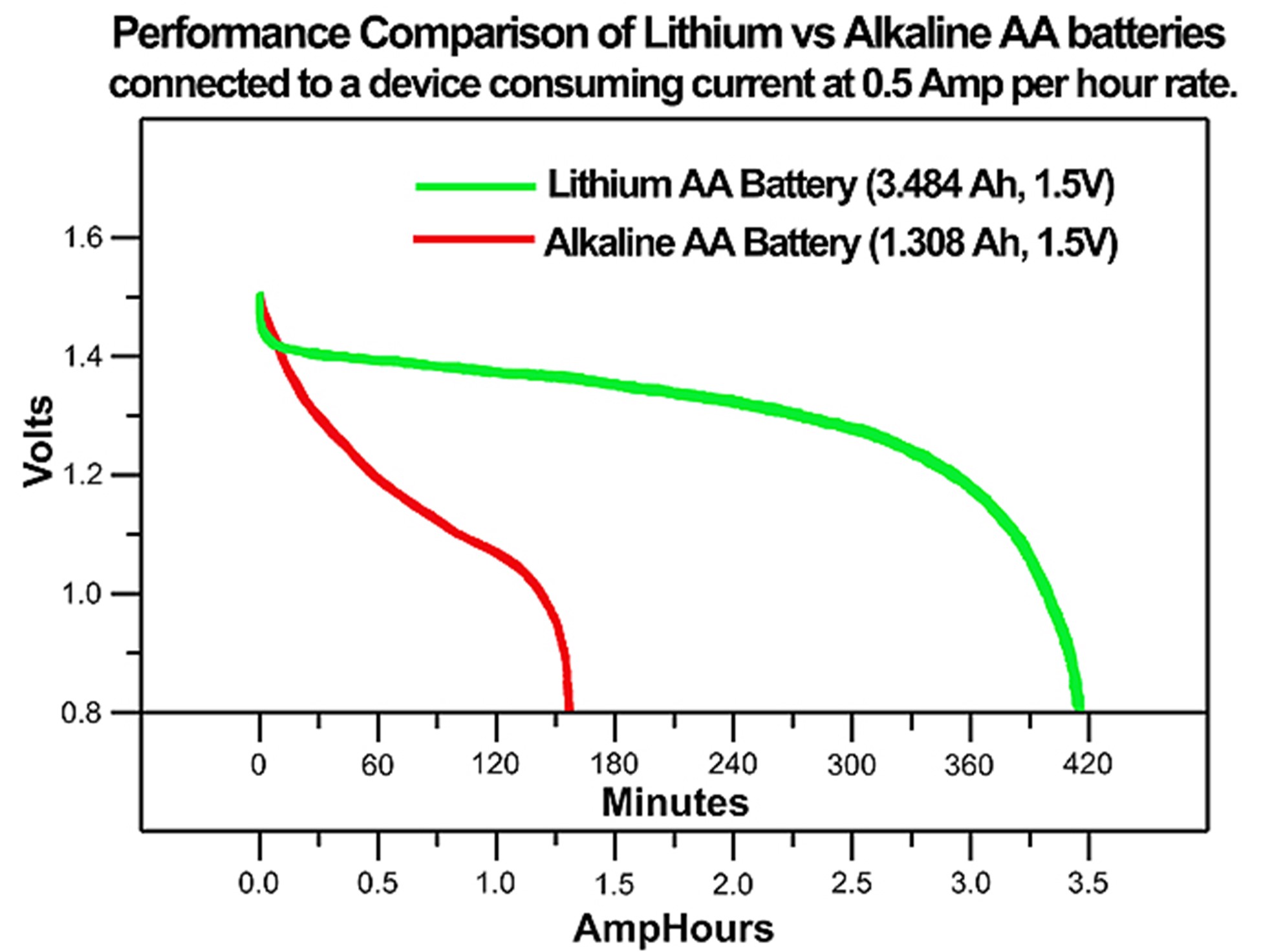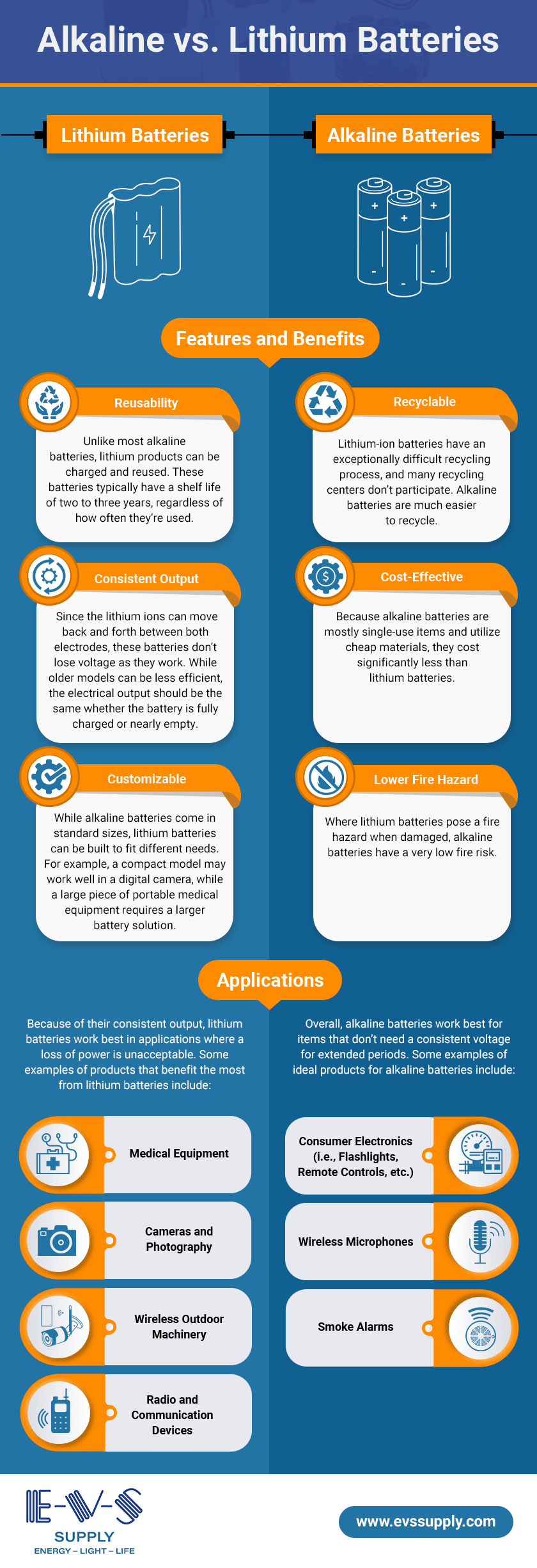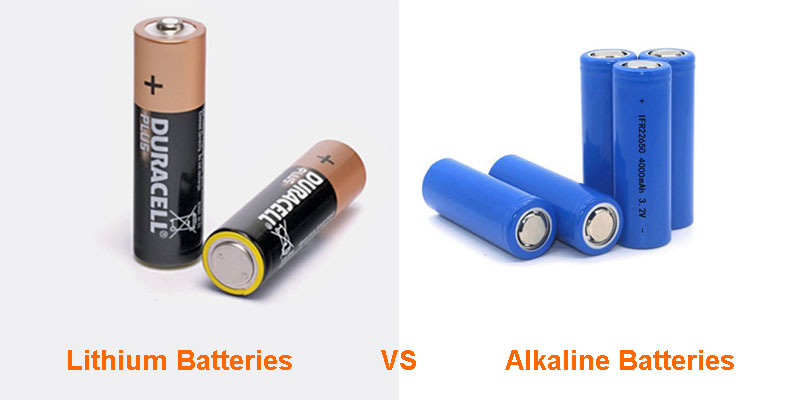Alkaline batteries are cost-effective and widely available, while lithium batteries offer a longer lifespan and better performance in extreme temperatures. Both are popular choices for powering a wide range of devices, and each has distinct advantages depending on the application.
Choosing the correct type of battery is crucial for optimizing device performance and longevity. Alkaline batteries are a go-to for everyday household items due to their affordability and availability. They perform well for low-drain devices like remote controls and wall clocks.
On the other hand, lithium batteries stand out in high-drain situations, such as in digital cameras or gaming controllers, where they provide a consistent power output and can last up to six times longer than their alkaline counterparts. They also boast a superior shelf life and operate effectively in high and low temperatures, making them ideal for outdoor or emergency equipment. Understanding these differences is critical for consumers and professionals to make informed decisions for their specific battery needs.

Alkaline vs Lithium Batteries
Alkaline and lithium batteries are commonly used but serve different purposes. Alkaline batteries, prevalent in AA and AAA forms, are cost-effective and widely used in household items like remote controls and clocks. They offer decent energy for low-drain devices and are disposable. In contrast, lithium batteries provide higher energy density, longer shelf life, and better performance in extreme temperatures, making them ideal for high-drain devices like cameras and medical equipment. While more expensive upfront, lithium batteries last significantly longer and maintain consistent output, often justifying their higher cost in power-hungry applications.
Introduction To Battery Chemistry
Batteries power our world, from remote controls to electric cars. Understanding battery chemistry is vital to choosing the right one for any application. Let’s dive into the basics of alkaline and lithium batteries.
Alkaline Batteries Basics
Alkaline batteries are standard in households. They work well in low-drain devices like clocks and TV remotes. Their chemistry involves zinc and manganese dioxide.
| Voltage | 1.5 volts |
|---|---|
| Pros | Cost-effective, widely available |
| Cons | Shorter life in high-drain devices |
| Rechargeable | No |
Lithium Batteries Essentials
Lithium batteries, which use lithium metal or compounds, offer high energy density, making them ideal for high-drain gadgets like cameras.
- Voltage: 3 volts or higher
- Pros: Long-lasting, suitable for extreme temperatures
- Cons: More expensive, can be volatile
- Rechargeable: Yes, many types
Essential Characteristics Of Alkaline Batteries
Exploring the world of batteries, alkaline types stand out for their unique features. They power our remotes, toys, and flashlights. Let’s dive into what makes alkaline batteries a go-to choice for many household devices.
Voltage And Capacity
Alkaline batteries typically boast a voltage of 1.5V, which is ideal for everyday gadgets. Their capacity, measured in milliampere-hours (mAh), varies with size. AA alkaline batteries may hold about 2000 to 3000 mAh, which means they last longer before needing a replacement.
Shelf Life And Stability
Shelf life is a strong point for alkaline batteries. They can sit unused for 5 to 10 years and still work. This is due to their stable chemical composition. It prevents quick power loss when not in use. So, you can buy them in bulk and not worry about them going bad.
| Battery Type | Voltage | Capacity (mAh) | Shelf Life |
|---|---|---|---|
| AA Alkaline | 1.5V | 2000-3000 | 5-10 years |
| AAA Alkaline | 1.5V | 1000-1200 | 5-10 years |
Key Characteristics Of Lithium Batteries
Lithium batteries stand out in the battery world. They power many devices. Phones, laptops, and cameras use them. They are known for their high energy and reliability. Let’s explore their key features.
Energy Density
Lithium batteries have a high energy density, storing more power. They last longer than alkaline batteries and are great for gadgets that need a lot of energy.
- Lightweight – Ideal for portable devices.
- More Power – Keeps devices running longer.
Temperature Tolerance
Lithium batteries are reliable for many uses. They suit outdoor gadgets and perform well in hot or cold temperatures.
| Temperature Range | Performance |
|---|---|
| Low Temperatures | Stable output |
| High Temperatures | Efficient performance |
Performance Comparison In Common Devices
Let’s explore how alkaline and lithium batteries perform in everyday devices. This comparison helps you choose the correct battery for your needs.
Remote Controls And Clocks
In remote controls and clocks, battery choice impacts lifespan and reliability.
- Alkaline batteries are cost-effective and widely available.
- They provide a steady performance for low-drain devices like clocks and remotes.
- Lithium batteries offer a longer lifespan in these devices.
- They are ideal for remotes used frequently, as they last longer.
Digital Cameras And Flashlights
Digital cameras and flashlights demand more power, affecting battery choice.
| Device | Alkaline Battery | Lithium Battery |
|---|---|---|
| Digital Cameras | Shorter life, less reliable in high-drain | Longer life, reliable performance |
| Flashlights | Suitable for short, infrequent use | Best for prolonged, intense use |
In digital cameras, lithium batteries outshine alkaline. They handle high energy needs better.
Lithium batteries ensure extended usage and reliability for flashlights during power outages or outdoor activities.
Longevity Factors
Understanding the longevity factors of batteries is crucial. Two common types are alkaline and lithium. Each has unique strengths and weaknesses. Let’s dive into how these aspects affect their lifespan.
Discharge Rates
The rate at which a battery loses power is its discharge rate. Alkaline batteries have a higher self-discharge rate compared to lithium batteries. This means lithium batteries stay charged longer when not in use. They are ideal for devices that require long-term, reliable power.
Rechargeability And Cycles
When considering rechargeable options, lithium batteries stand out. They support more charge cycles than alkaline rechargeables. This makes them a better choice for devices that you charge often. To illustrate:
- Alkaline rechargeable batteries can endure around 100 charge cycles.
- Lithium rechargeable batteries can handle up to 1000 cycles.
Choose lithium for gadgets you use daily. Alkaline may be more cost-effective for infrequent use.

Credit: m.youtube.com
Environmental Impact And Disposal
The debate between alkaline and lithium batteries extends beyond their power capabilities. Environmental concerns play a significant role. Proper disposal and the impact of these batteries on the environment are critical factors to consider. Each type of battery has a different footprint on our planet.
Toxicity And Recycling
Lithium and alkaline batteries differ in toxicity. Alkaline batteries contain fewer toxic metals than older battery technologies. Yet, they are often disposed of in regular trash, which can still lead to environmental issues.
On the other hand, lithium batteries contain heavy metals, which can be harmful. They should not end up in landfills; it’s essential to recycle them properly.
- Alkaline batteries: Generally considered non-hazardous. Recycling options are available but not always used.
- Lithium batteries: They must be recycled to prevent toxic metal leaks. Specialized facilities handle them.
Regulations And Compliance
Regulations are in place to manage battery disposal. These rules help protect our environment. For example, the Mercury-Containing and Rechargeable Battery Management Act in the United States.
| Type of Battery | Regulations |
|---|---|
| Alkaline | Less regulated due to lower toxicity. Some regions encourage recycling. |
| Lithium | Strictly regulated. Recycling is often mandatory. |
Consumers and companies must follow these regulations. Proper disposal is vital to minimize environmental damage.
Economic Considerations
Understanding the economic implications is crucial when choosing between alkaline and lithium batteries. This section explores how costs, savings, and market trends influence your decision.
Initial Cost Vs. Long-term Savings
Lithium batteries often have a higher initial cost compared to alkaline batteries. Yet, they last longer. This means fewer replacements and potential savings over time. The cost-effectiveness is broken out in the table below:
| Battery Type | Initial Cost | Average Lifespan | Cost Over 5 Years |
|---|---|---|---|
| Alkaline | $5 | 200 hours | $25 |
| Lithium | $10 | 1000 hours | $10 |
Lithium batteries offer savings in the long run despite the higher upfront cost.
Availability And Market Trends
Lithium batteries are gaining popularity due to their efficiency and longevity. They are widely available in various sizes and types for different devices. Below are the current market trends:
- Increase in demand for rechargeable lithium batteries
- Steady prices due to improved technology
- Broader adoption in high-drain devices like digital cameras and smart devices
This trend shows a shift towards lithium as a cost-effective option for many consumers.
Making The Right Choice For Your Needs
Choosing the correct battery is essential for optimal device performance. Both alkaline and lithium batteries offer unique benefits. Users must understand their needs to make an informed decision.
Personal And Professional Use
Alkaline batteries are sufficient for everyday items like remote controls or wall clocks. They are cost-effective and readily available. In contrast, professional settings demand more robust solutions. Lithium batteries excel here. They provide longer life and stable power. High-end electronics and critical medical equipment often rely on lithium batteries.
Recommendations For Specific Applications
Consider the device’s power needs. For low-drain devices, alkaline batteries are a wise choice. They offer a good shelf life and are budget-friendly.
Lithium batteries are ideal for high-drain devices like digital cameras and gaming controllers. Their performance in extreme temperatures is also a plus.
| Device Type | Alkaline Battery Use | Lithium Battery Use |
|---|---|---|
| Remote Controls | Yes | No |
| Wall Clocks | Yes | No |
| Digital Cameras | No | Yes |
| Gaming Controllers | No | Yes |
- Alkaline batteries are suitable for low-cost, low-power consumption.
- Lithium batteries serve high-power devices and extreme weather use.
Always check the manufacturer’s recommendation. It ensures device safety and peak performance.
Future Of Battery Technology
Exploring the future of battery technology reveals a dynamic battleground between alkaline and lithium batteries. Breakthroughs in power storage are reshaping our world. Let’s dive into the latest advancements and alternatives.
Advancements In Longevity
The race for longer-lasting batteries is heating up. Scientists are pushing the limits of charge cycles and energy density, which means more power and longer device life.
- Lithium batteries are leading the charge with a higher number of recharge cycles.
- Researchers are developing new electrolytes to boost lithium battery life.
- Alkaline batteries are evolving, too, with improved formulas that last longer.
Emerging Alternatives
Beyond traditional batteries, exciting new alternatives are emerging.
| Technology | Benefits |
|---|---|
| Solid-State Batteries | Higher energy, safer |
| Graphene Batteries | Fast charging, durable |
| Bio-Batteries | Eco-friendly, renewable |
Innovators are blending cutting-edge chemistry and nanotechnology to create these power sources. Devices will soon have batteries that charge in minutes, not hours. They will also be safer and made from sustainable materials.

Credit: support.simpleaccess.com

Credit: www.evssupply.com
Frequently Asked Questions
Which Batteries Are Better, Alkaline Or Lithium?
Lithium batteries offer a longer lifespan and better performance in extreme temperatures than alkaline batteries. They are also perfect for portable devices because they are lightweight.
What Happens If I Replace My Lithium Batteries With Alkaline Batteries?
Due to different voltage and discharge properties, using alkaline batteries instead of lithium can result in lower performance and shorter life.
What Would Happen If You Put Alkaline Batteries in the Blink Instead of Lithium?
Using alkaline batteries in Blink cameras can reduce performance and shorten lifespan. Always use lithium batteries as recommended for optimal functionality.
Should I Use Lithium Or Alkaline Batteries In My Smoke Detector?
Use lithium batteries in your smoke detector for longer life and more reliable performance than alkaline batteries.
Conclusion
Choosing between alkaline and lithium batteries depends on your needs. Alkaline batteries are cost-effective for low-drain devices. In contrast, lithium batteries excel in high-power applications and offer longer life. Consider your device’s requirements and budget before making a decision. Both types have distinct advantages that can enhance your device’s performance.

I am a battery specialist writer and blogger based in the USA & UK . I have been working with battery power energy for 3 long years and I give trips on low battery power problem and solutions . I have a lot of experience with battery power and I share them here.

